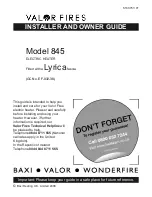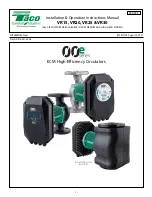
-
4
-
1
TECHNICAL SPECIFICATION OF PRODUCT
1.1
FUNCTION DESCRIPTION
The heater is designed for accumulation heating of service water using electricity or thermal energy via an
exchanger (for the combined design only).
Water is heated by an electric element (or a heat exchanger) in
an enamelled thermally insulated accumulator at the time defined by the power supplier.
The element is at
the time of heating controlled by a thermostat the temperature of which can be adjusted continuously
(within the range between 5°C and 74°C).
Once the selected temperature is reached, heating interrupts
automatically. Water accumulated in the tank is then used for consumption.
The tank keeps constant
pressure of water from the water main.
If the combination faucet hot water valve is opened, water from
the water supply conduit pressed out by cold water pressure flows out of the heater.
Hot water flows out
through the top part, and water flowing in remains in the bottom part of the heater.
Pressure principle
allows hot water withdrawal at any place from the heater (
Figure 6
).
1.2
ADVICE FOR CUSTOMERS
1.2.1
HOT WATER CONSUMPTION
Consumption of hot water in households depends on the number of people, amount of
sanitary equipment, length, diameter and insulation of piping in the flat, or on individual
habits of users.
The cheapest option of water heating comes at the time when the
electricity rate is reduced.
Find out in what time intervals your electricity supplier provides reduced tariff and,
depending on that information, select relevant volume and power input of the heater so that
your hot water consumption covered the needs of your household.
1.2.2
ENERGY SAVING
Consumption of hot water in households depends on the number
of people, amount of
sanitary equipment, length, diameter and insulation of piping in the flat, or on individual
habits of users.
Hot utility water reservoir is insulated by means of a first
-
class polyurethane foam with zero
Freon content.
Adjust the temperature of the heater's thermostat to that level only that you
need to run your home. Thus you will reduce electricity consumption, as well as the amount
of lime sediments on the walls of the receptacle and on the heat exchanger.





































